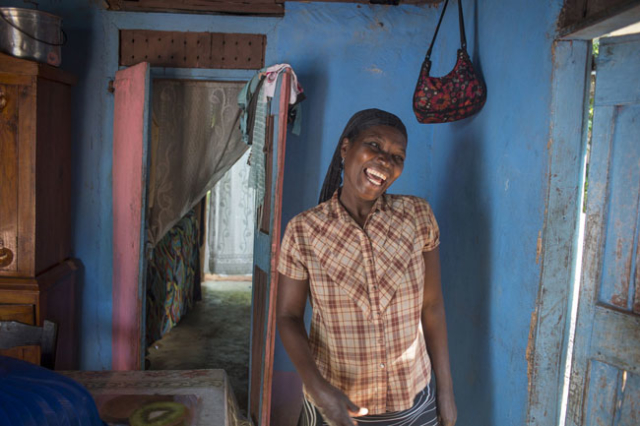Wars, disasters, poverty and a lack of city planning and protection of human rights means a large proportion of the world’s population doesn’t have access to adequate housing.
The 2015 United Nations report on adequate housing estimates that around 400,000 people live on the streets in Europe. Around 320,000 children were sleeping outside after the earthquake in Nepal.
The growth in informal settlements means many people in Asia, Latin America and Africa have poor housing. They don’t have necessary basic services and they live in areas that are in danger from natural phenomena.

Caritas sees housing as a vital space for growth, for a social life and for social inclusion where people can exercise all their other rights such as educations, health and employment. Photo by Caritas
The migration situation exacerbates these problems. In seeking refuge in other areas, migrant communities face greater challenges, as they are unable to access housing benefits. Low wages, discrimination and the prejudice they face in the societies where they live makes it more difficult for them to put a roof over their heads.
Being able to develop in an adequate space is vital for having a decent life. This means a place where people can enjoy themselves and meet their basic needs. Therefore, the right to adequate housing, which should be in a clean, sustainable and accessible environment is indispensable, not only in cities but also in small towns and rural areas, is essential.
The Catholic Church champions the right to housing as a requirement of the common good and the right to enjoy the goods of the earth. Respect for people’s rights, material and spiritual, means that they have a decent life. The Church defends the right to housing as a fundamental right, as it considers it to be a vital space for socialisation and a factor of social inclusion of primary importance. Its lack hinders the fulfilment of the individual.
The Habitat I conference was held by the General Assembly of the United Nations in 1976. Governments present recognised that accelerated world growth hampered sustainable human settlements.
On that occasion, the UN Centre for Human Settlements (Habitat Programme) was established. Caritas and world leaders who participated accepted the Adequate Housing for All action plan. Habitat II was in 1996 and Habitat III is in Quito, Ecuador in October 2016.
Caritas’ commitment to adequate housing is reflected in actions which comply with Sustainable Development Goal 11 on safe, resilient and sustainable cities. The New Urban Agenda – the final statement from Habitat III – will be a guide for sustainable urban development.
The reform is to guarantee housing and a decent, adequate, clean and accessible environment to the most vulnerable. Creation of an adequate physical space will have positive repercussions on people’s personal and social relations.

Caritas says housing and public spaces in cities must have at the core of their conception social justice, integral human development and the protection of human rights. Photo by Secours Catholique/Elodie Perriot
Caritas in favour of a home for all
Caritas Internationalis has projects in many countries in support of people who are suffering from lack of housing due to natural phenomena or political and economic situations.
In the last ten years, in New York City, the shortage of affordable housing together with federal and state budget cuts have had an impact on the growing numbers of evictions and homeless people. The establishment of benefits to support evicted and homeless families and individuals has eased this situation. This is the case with the Catholic Charities (a US member of Caritas) Community Service Preserving Housing programme.
People in the Middle Eastern countries who have lost their homes due to violence have been accompanied by Caritas and offered access to shelter in the Middle East and in Europe.
The Caritas Lebanon report on the housing service for refugees, “A place called home: analysis of the housing of Syrian refugees in Lebanon”, explains the mixed service approach that combines assistance with rent, more protection services and awareness raising, which has turned out to be efficient and satisfactory for the majority of refugees.
In Iran, the local Caritas rebuilt almost 100 homes for patients with spinal cord injuries who were affected by the earthquake in the city of Bam in 2003. The aim was to guarantee a safe, hygienic and accessible environment for the new living conditions in this country.
After the earthquake in 2010, Caritas Haiti provided a comprehensive, permanent response to the housing problems of 5,000 families that were directly or indirectly affected.
Caritas’ work is based on the premise that the most vulnerable people whould have access to and are guaranteed the right to decent, adequate, sustainable, clean and accessible housing.
Caritas also advocates for public policies that deal with possible ways for everyone to have access to an adequate habitat in which they may lead a full life.
